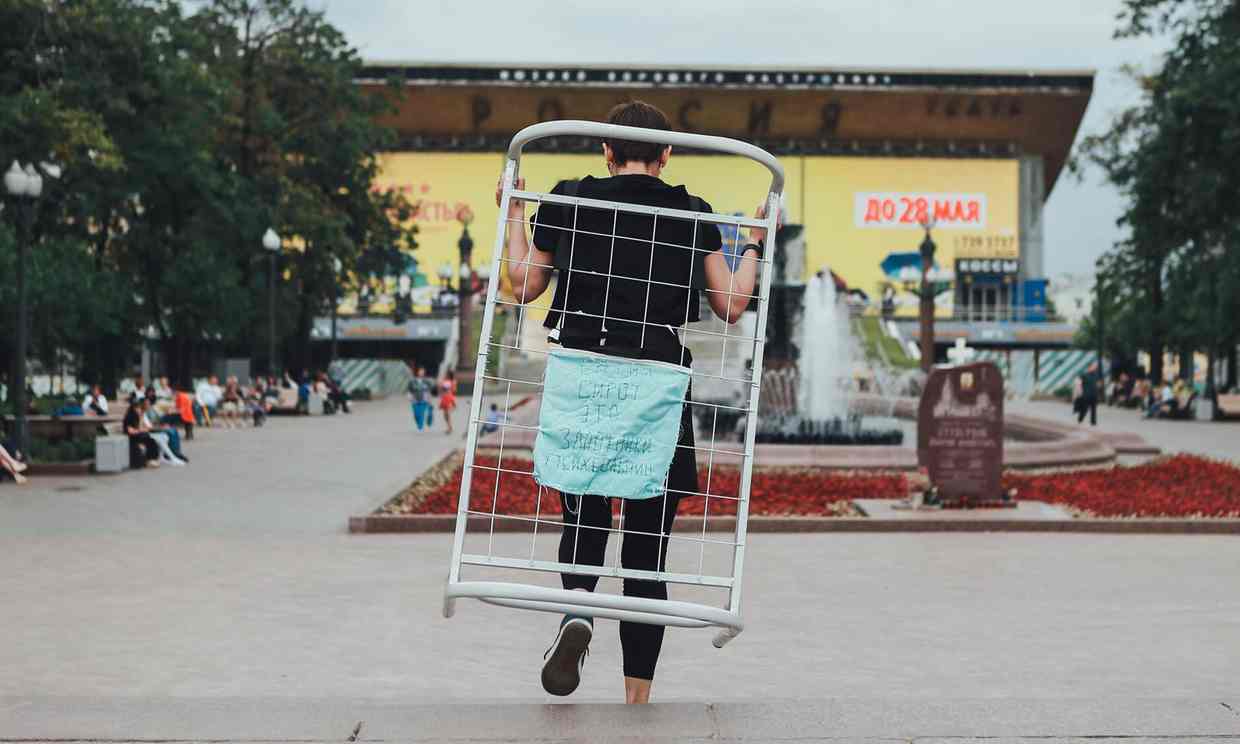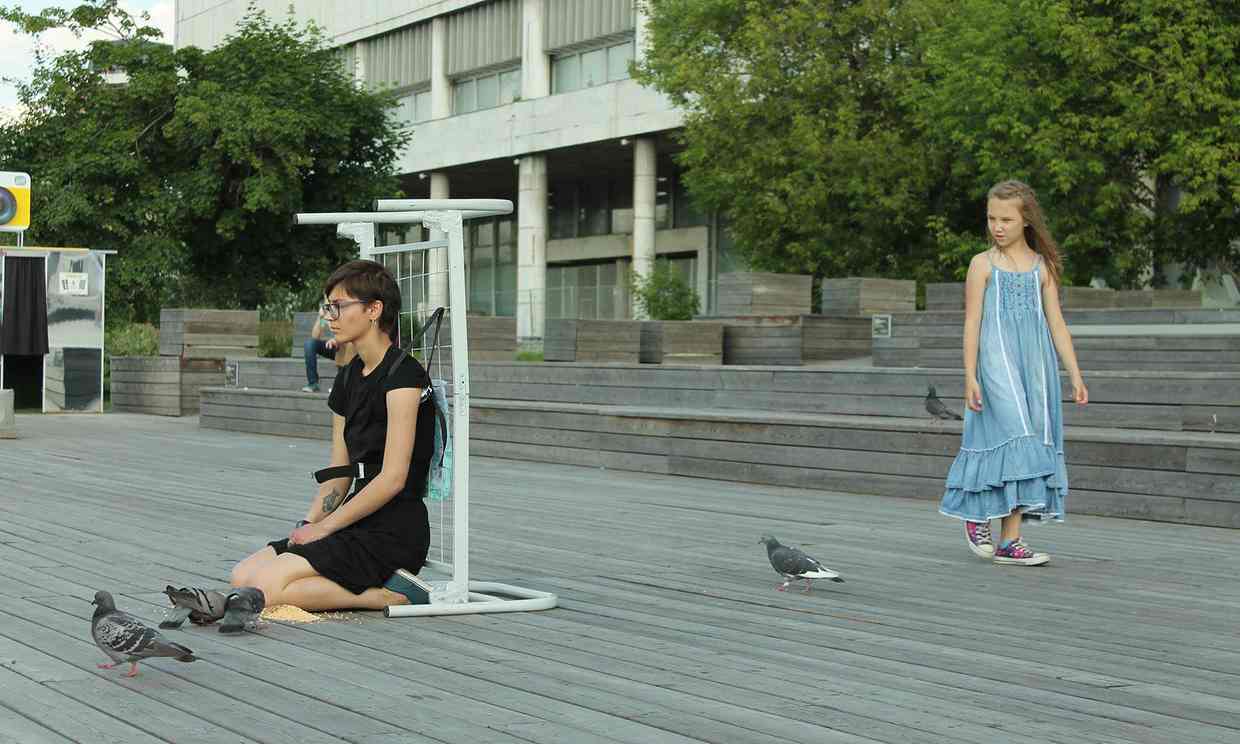Artist warns of return to ‘punitive Soviet psychiatry’ in Russian orphanages
by Sasha Raspopina, July 05 2016.
 |
| Photograph: Artem Sizov |
Katrin Nenasheva has been dragging a metal bed frame through Moscow for weeks to raise awareness of child abuse in state care.
For the last three weeks, commuters in Russia’s capital have been
greeted with the unusual sight of a young woman lugging a metal bed
frame on her back.
In a public performance across the city centre, artist and activist
Katrin Nenasheva has been carrying the bed to raise awareness of the
human rights abuses being committed inside Russian orphanages.
“Children in orphanages in rural Russia are sent to psychiatric facilities as a form of punishment for misbehaving,” Nenasheva wrote in a Facebook post
explaining her performance. “In some institutions this is a practice
that has existed for a long time, in its roots it’s dating back to the
punitive psychiatry in the Soviet Union.”
Rarely covered by the Russian media, the issue was briefly thrust into the headlines in recent weeks after 15 children, mostly from care homes, drowned during a boat trip.
The artist said she hoped her three-week performance would help trigger
a broader public conversation about the way children are treated by
state institutions.
Nenasheva used to work for Razniye Deti and Reka Detstva,
two NGOs supporting orphaned children with learning difficulties,
disabilities or mental health issues. She explains that it is these
children who often find themselves placed in “corrective” psychiatric
facilities, and where many are prescribed a so-called constant bed
regime, banned from freely moving around.
A 2014 investigation by Human Rights Watch found that
children with severe disabilities were kept in “‘lying-down’ rooms,
where they are confined to cribs and often tied to furniture with rags”.
It estimated that nearly 30% of children with disabilities live in
state orphanages.
According to the latest data from the Russian Ministry of Labour and
Social Protection, there are 122 corrective orphanages in the country, currently housing 20,000 children.
Julia Baranovskaya, a lawyer and one of the founders of the Stop PNI
(psycho-neurological homes as they’re officially named, otherwise known
as corrective facilities), said that though there is an overwhelming
amount of testimony from children and young adults regarding abuse,
gathering evidence that could lead to a successful prosecution is nearly
impossible.
 |
| Photograph: Alexey Bachinskiy |
“Imagine you are a child who’s lived in these facilities for your
whole life. This system is the only one you know, you don’t know you can
complain if someone is mistreating you. There are no working mechanisms
of complaining or controlling this,” she said.
In cases where young people have come forward with accusations of
historic abuse, like the teenagers Nenasheva quotes in her performance,
there is no way to investigate the claims or gather evidence, such as
medical notes or physical exams, because outsiders are largely banned
from entering the homes.
“These facilities have a restricted status, meaning people from the
outside, like activists or NGOs, or relatives of the people inside,
can’t just walk in there freely – the visiting times are usually limited
to about five hours a week,” Baranovskaya said.
Nenasheva added that if there is any suggestion visitors want to
enter for investigative purposes, “security won’t even let you through
the gate, and if you’re an activist who takes [these] issues to the
public level – you just might not be allowed inside ever again.”
Public conversation
But Elena Klochko, who works with the Russian government to develop
government policy on child protection, said that even though there are
cases of human rights violations the situation has started to improve.
“Since the public attention to these issues grew in the last three to
four years, we have seen improvement, for example we pushed to make
sure their right to education is never breached. Our aim now is to
carefully de-institutionalise the whole system. We need to get rid of
the ‘restricted’ facilities altogether,” she said.
Perhaps surprisingly, artists have played a major role in bringing
attention to this issue. In 2014, Petr Pavlensky, the notorious
performance artist, cut off his earlobe to protest against the police “returning to the use of psychiatry for political goals.”
With a continued dearth of reporting on the subject in the Russian
media, Nenasheva has used social media to document her performance, and
accounts of her encounters with passers-by suggested her stunt may have
had some impact.
In a post published on Facebook, Nenasheva described how one woman in a supermarket was moved to share her own story.
“My uncle was sent to a psychiatric hospital in the 1950s for
dissent, for three months. He spent several years trying to recover from
that – being strapped to a bed and fed pills and then just left to lie
there. I didn’t know this still happened, and to children too,” the woman said.
SOURCE: The Guardian


